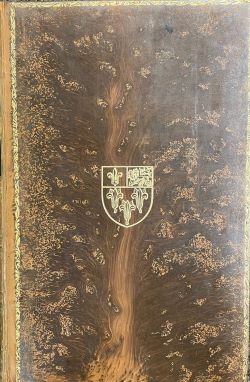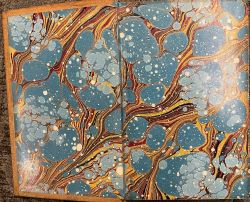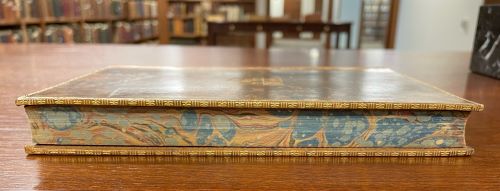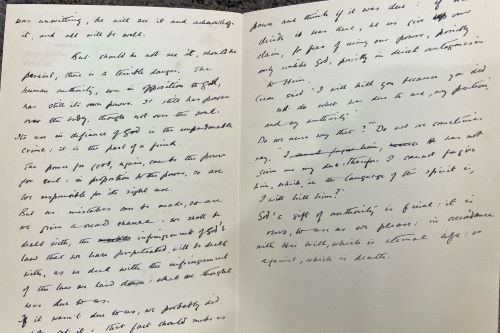Antigone is one of the greatest literary debates about freedom and responsibility in human history, and one of our most enduring works of literature as well. Pierre Goodrich's 1900 edition of Antigone is clearly well loved, and carefully read. And it provides a beautiful housing for a literary work of immeasurable importance.
The Reading Room
Antigone: From the Liberty Fund Rare Book Room
 The cover of Goodrich's Antigone is well cared for, but well worn. It and the spine are charmingly gold stamped, but it is upon opening the book that the visitor to the archives begins to discover the pleasures of this copy.
The cover of Goodrich's Antigone is well cared for, but well worn. It and the spine are charmingly gold stamped, but it is upon opening the book that the visitor to the archives begins to discover the pleasures of this copy.
The edition's endpapers are a glorious riot of colorful marbling that, looking more closely, we realize is replicated on the tinted page edges.

As if all this isn't treasure enough, the volume also contains multiple pages of notes taken by Pierre Goodrich--perhaps when he was a student at Wabash College? Perhaps for his own personal study?--that clearly demonstrate his close engagement with the text and its themes, as well as his ability to understand the Greek as well as the English translation.
A brief excerpt from his notes reads:
But our power may have been used wrongly. We have set up an opposition between the law of God and the law of man. Let the ruler better rule himself. If the errors are unwitting, he will see it and acknowledge it, and all will be well. But should he not see it, there is a terrible danger. The human authority, even in opposition to God, has still its own power. It still has power over the body, though not over the soul. Its use in defiance of God is the unpardonable crime: it is the part of a fiend.The power for good, again, can be the power for evil: in proportion to this power, so are we responsible for its right use. But as mistakes can be made, so are we given a second chance: we shall be dealt with, the infringement of God’s law that we have perpetrated will be dealt with, as we deal with the infringement of the laws we laid down: what we thought was due to us.
 Sophocles is one of the authors Pierre Goodrich considered important enough to carve into the stone walls of the Goodrich Seminar Room. Antigone is the Sophoclean work that he mentions specifically in his ever-evolving list of books that should guide the intellectual pursuits of Liberty Fund. The edition in his library beautifully displays--aesthetically and intellectually--his intense relationship with the play. Perhaps it's a good time for a re-read?
Sophocles is one of the authors Pierre Goodrich considered important enough to carve into the stone walls of the Goodrich Seminar Room. Antigone is the Sophoclean work that he mentions specifically in his ever-evolving list of books that should guide the intellectual pursuits of Liberty Fund. The edition in his library beautifully displays--aesthetically and intellectually--his intense relationship with the play. Perhaps it's a good time for a re-read?
Comments:
Garth Bond
What a wonderful reflection on the play.